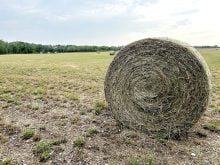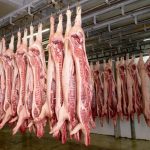Reuters / French wheat producers and traders agreed Dec. 3 to start specifying protein content in all commercial contracts as an incentive to address what has become a weakness for the European Union’s top wheat exporter.
Protein content is a basic measure of wheat’s suitability for making bread and a key requirement for importers of the food staple in Africa and the Middle East.
The lowest level of protein for years in this summer’s French wheat harvest intensified a debate about declining crop quality and its potential threat to exports. The absence of clear quality-based pricing on the French market is seen as one of the reasons for slipping protein levels.
Read Also

Cereal cover crops show mixed flea beetle protection
University of Manitoba researchers are testing if planting fall rye and oat nurse crops help growers reduce damage without hurting yield.
The proposal approved under the aegis of grain sector association Intercereales calls for physical market contracts to state the protein content of the wheat being marketed.
Wheat contracts in France already have to specify certain quality criteria such as moisture levels or the maximum amount of broken grains, but any mention of protein is currently at the discretion of the parties involved.
Although the plan stops short of the kind of wheat quality scale used in other exporting countries for determining prices, the French sector hopes the move will lead to a greater price difference between lower- and higher-protein wheat.
“The aim is to put a price on protein and, in the longer term, to bring back up average protein levels,” Hervé Le Stum, director of Intercereales, said.
The agreement is voluntary but Intercereales said it will ask the government to make this compulsory for transactions as of the 2014-15 marketing season that starts on July 1.
More differentiated prices would reward farmers for investing in techniques, like seed selection and high-precision fertilization, that favour increased protein, trade representatives say.
Average protein content in this year’s French harvest was 11.2 per cent, the lowest since at least 2009 and scarcely meeting the minimum requirement of major export clients.
Poor growing weather in the past year and climate change more generally have played a part in the protein drop. But there is now a consensus that the market has overlooked protein in a high-yield production model in recent years.
The focus on volume has proved successful in raising French exports at a time of booming demand from emerging countries. The country now ships about 10 million tonnes of wheat annually, nearly a third of its harvest, outside the EU in one of France’s rare trade surpluses.
But traders worry that this export model is being strained by the rise of Black Sea suppliers like Russia and Ukraine that can match French quality at a lower cost.
This has made French exporters nervous about losing core markets like Algeria and Morocco, while also making it more difficult for them to get a foothold in Middle Eastern countries like Iraq and Jordan that buy high-protein wheat.














